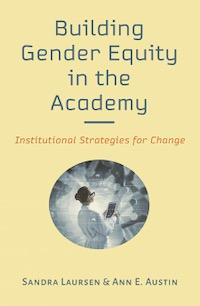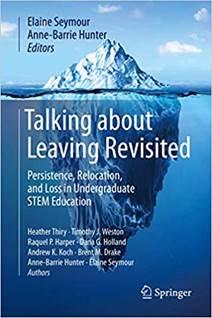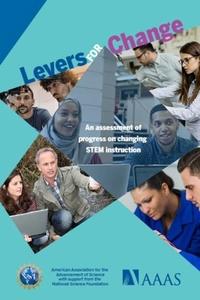Home
Ethnography & Evaluation Research (E&ER) is an independent research unit at the University of Colorado Boulder with a distinguished history of building knowledge about science, technology, engineering, and mathematics (STEM) education and careers, and a tradition of communicating this work effectively with practitioners. Our work has helped to shape reforms in undergraduate STEM education for over 30 years.
Collectively, our research team is multi-disciplinary, STEM-savvy, and skilled in conducting and sharing research and evaluation to help faculty and institutions improve their STEM education practices. E&ER team members have also studied issues in health, social justice, the workforce, and the legal system.
To expand our capabilities and connect our findings to practice, E&ER draws on a network of colleagues and collaborators in education, government, research, and evaluation. Our work has been supported by the National Science Foundation, the National Institutes of Health, Howard Hughes Medical Institute, Research Corporation for Science Advancement, the Alfred P. Sloan Foundation, the Noyce Foundation, the Camille & Henry Dreyfus Foundation, the Spencer Foundation, and the Educational Advancement Foundation, and through contracts with colleges, universities, laboratories, and other organizations. At CU Boulder, E&ER is housed within the Center to Advance Research and Teaching in the Social Sciences (CARTSS).
New from E&ER
⚠️ Boring but important ⚠️ Links to documents across this site were updated (3/2025) after a platform change to all CU Boulder websites. Please let us know if you stumble upon a missing link or need something you can't find!
June 2025: Several E&ER people took part in the 2025 Transforming Institutions Conference, focused on aligning change efforts across higher education. Sarah Wise and Joel Corbo presented sessions on their work with Departmental Action Teams, and Sandra Laursen presented on theories of change for transforming teaching evaluation, and on scaffolding processes for change leadership teams.
February 2025: E&ER scholars presented at the RUME conference, Research on Undergraduate Mathematics Education, in Alexandria, VA. Jenny Valadez Fraire shared a poster on evaluating online professional development. Nancy Kress shared a poster analyzing teaching changes by math instructors in response to the COVID pandemic. And Sandra Laursen presented a talk on using student surveys to measure departmental change in STEM instruction, work done with Tim Archie, and a plenary session, "On whales, warblers, and pedagogy: Knowing, doing, and measuring in studies of college teaching in mathematics," about our efforts to measure teaching in order to know if it is changing over time.
October 2024: New paper on community college biology instructors' uptake of evidence-based teaching practices, led by Tim Archie and out now in CBE Life Sciences Education.
October 2023: Together with colleagues from the CIRTL Network, Sandra Laursen contributed to this paper about online professional development for future STEM faculty, through two MOOCs on evidence-based teaching. We analyzed participation, self-reported outcomes, and the affordances of the MOOC-centered learning communities for supporting learners.
March 2023: Thrilled to share this important piece on analyzing classroom observation data from segmented and holistic protocols, led by Tim Weston. Check it out in the International Journal of STEM Education!
December 2022: We have a chapter in the newly published Handbook of STEM Faculty Development. Our chapter, "The Cycle of Inquiry: Building Effective Evaluation Relationships to Support Continuous Improvement of Faculty Development Initiatives," was led by Chuck Hayward. The handbook has an impressive author list and a lot of great topics; check it out at the link and read our chapter here.
June 2022: New paper on two-year college (2YC) biology classes: What evidence-based instructional practices benefit 2YC students, which approaches do 2YC instructors use, and what supports or barriers do they encounter in doing so? Sarah Wise and colleagues offer some answers from literature and instructor interviews.
May 2022: Worth the wait! E&ER collaborated on this description of a four-strand model for workshops on inquiry-based learning for math educators. Archie et al. (2022) told you that these workshops work; here Yoshinobu et al. (2022) explain why.
May 2022: The 20th anniversary issue of the ADVANCE Journal celebrates two decades of this ground-breaking program to advance gender equity on STEM faculties. Sue Rosser and Sandra Laursen reviewed the ADVANCE program's accomplishments, progress, and challenges for the future in Looking back to look forward: A retrospective examination of ADVANCE.
April 2022: Delighted to announce a new paper led by Tim Archie in PLOS One! Drawing on a ten-year data set, we use a structural equation model based on the theory of planned behavior to see how professional development influenced teaching practice. Participation in a significant, multi-day workshop was the major influence on instructors' uptake of research-based teaching practices, with a boost from some contextual factors too.
July 2021: Our new paper, led by Tim Weston, examines the importance of time sampling in using classroom observations to study teaching practice. Turns out it takes a lot of observing to fairly characterize teaching across a whole course— especially when instructors use active learning approaches, which make class time more variable. Check out When seeing is believing in the American Journal of Evaluation (Online First).
May 2021: We are pleased to share new results from analyses led by Tim Archie on the outcomes of professional development workshops on inquiry-based learning for college math instructors. Well-designed intensive workshops make a difference! Pick your format: 3-minute video at the STEM for All Video Showcase, blog post at the AIBL website, poster from the AAC&U 2020 STEM ed conference, and 13-minute video-recorded talk from the 2021 Joint Math Meetings. More good stuff coming soon!
November 2020: Check out our new book, Building Gender Equity in the Academy: Institutional Strategies for Change, by Sandra Laursen and Ann E. Austin from Johns Hopkins University Press. This handbook is based in research about ADVANCE Institutional Transformation efforts and aimed at busy academic leaders who seek evidence-based strategies to improve institutional environments for academic women. We are excited about the potential for this work to reach people in positions to lead strategic institutional change! Check out more resources related to the book here.
September 2020: The coauthored volume, Talking about Leaving Revisited: Persistence, Relocation and Loss in Undergraduate STEM Education is now available from Springer. This work is a follow-up study of STEM majors' switching and persistence, conducted at five of the original sites studied two decades ago in Talking about Leaving (1997).
June 2020: New video resource: An overview of research by Sandra Laursen and E&ER colleagues about learning and teaching in college mathematics classrooms that use inquiry-based learning (IBL) approaches. This video-recorded talk (23 min.) places our team's work in context with other literature about active learning and equitable classroom environments, in support of instructors new to inquiry-based mathematics education (IBME).
August 2019: Levers for Change: An assessment of progress on changing STEM instruction is now available! The report draws on scholarly reviews and practitioner discussions to capture a snapshot of the current state of research-based reform in undergraduate STEM instruction. It identifies key levers for change used to reach this state, and it suggests additional levers for fostering further change in the next decade. The project was led by Sandra Laursen for AAAS, with support from NSF and HHMI.
February 2019: Check out the two-volume special issue of Equality, Diversity and Inclusion: An International Journal, with a raft of good papers on the NSF ADVANCE program (Part 1, Part 2). Sandra Laursen and Kris De Welde, College of Charleston, have a paper analyzing ADVANCE program solicitations.
February 2019: Excited to have a research commentary on inquiry-based mathematics education with Chris Rasmussen, San Diego State, appear in IJRUME!
November 2018: Success after Tenure: Supporting Mid-Career Faculty is out this month. Sandra Laursen and collaborator Ann Austin of Michigan State have a chapter in this volume.
September 2018: We're proud to have chipped in on the collaborative project that produced the new volume, Researching and Enacting Change in Postsecondary Education: Leveraging Instructors' Social Networks. Check it out!
July 2018: We have two new papers out this summer, both on communities formed around inquiry-based learning in mathematics: Hayward & Laursen on support for instructors after an IBL workshop, and Haberler, Laursen & Hayward on IBL as a social movement. Check 'em out!
June 2017: The National Academies of Sciences, Engineering, and Medicine released its report on Effective Mentoring in STEMM: Practice, Research, and Future Directions. E&ER's Sandra Laursen was a plenary speaker at this workshop, with Paul Hernandez of West Virginia University.
April 2017: We're honored to have our piece on fundamental tensions of undergraduate research included in a new compilation of "greatest hits" from Change magazine, College Teaching and Learning for Change: Students and Faculty Speak Out. Edited by long-time Change editor Peg Miller, this volume focuses on experiences that change college students' lives. Check it out!
February 2017: The National Academies of Sciences, Engineering, and Medicine released its report on Undergraduate Research Experiences for STEM Students: Successes, Challenges, & Opportunities. E&ER's Heather Thiry was part of the committee that prepared this report.
March 2014: The StratEGIC Toolkit has launched! The Toolkit offers research-based advice about strategic interventions useful in organizational change to enhance the representation, involvement and success of women scholars in STEM fields.
Fall 2013: We contributed to a new publication from AAAS on Describing & Measuring Undergraduate Teaching Practices (2013). The report discusses the strengths and weaknesses of various approaches to measuring undergraduate teaching practices, including faculty and student surveys, faculty interviews, classroom observations, portfolios, and other artifacts.





